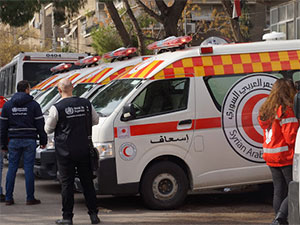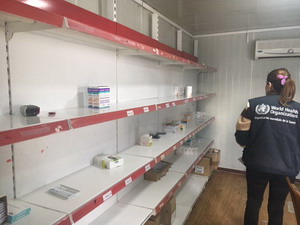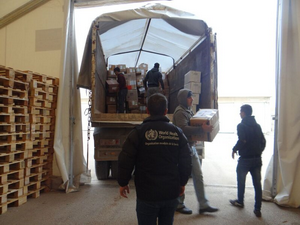WHO statement on health situation in Rukban, Syria
17 January 2019, Damascus, Syria – The World Health Organization expresses severe concern about the deteriorating humanitarian conditions in Rukban settlement close to the border with Jordan, and calls for immediate access to the settlement to assess the health situation, provide essential medicines and medical supplies, and support the medical evacuation of critically ill patients.
Approximately 40 000 people, mostly women and children, remain stranded in the settlement and are unable to leave, and harsh winter conditions have reportedly led to several deaths. Health care facilities are barely functioning and have very few staff or medical supplies. There are no generators or fuel to provide even minimum warmth to alleviate the bitterly cold weather.
With support from Japan, WHO delivers 16 ambulances to improve referral and emergency health services in Syria
 10 January 2019. Today, using a generous contribution from the Government of Japan, WHO handed over 16 ambulances to the Syrian Arab Red Crescent (SARC). The ambulances will help improve referral and emergency services in critically underserved governorates.
10 January 2019. Today, using a generous contribution from the Government of Japan, WHO handed over 16 ambulances to the Syrian Arab Red Crescent (SARC). The ambulances will help improve referral and emergency services in critically underserved governorates.
The donation comes at a crucial moment. The demand for health care services has continued to grow as more areas in the country become accessible. Moreover, thousands of people are returning to their homes to find that basic health care and referral services have been badly disrupted. The ambulances will allow the SARC to provide emergency health care and referral services in areas of high need, potentially saving the lives of many vulnerable people.
US$ 2.5 million to improve health response for Syrian refugees in Iraq
 Baghdad 8 January 2019 – The World Health Organization (WHO) extends its gratitude to the US Department of State Bureau of Population, Refugees and Migration (BPRM) for the generous contribution of US$ 2.5 million to support the health security of Syrian refugees living in Iraq.
Baghdad 8 January 2019 – The World Health Organization (WHO) extends its gratitude to the US Department of State Bureau of Population, Refugees and Migration (BPRM) for the generous contribution of US$ 2.5 million to support the health security of Syrian refugees living in Iraq.
Iraq continued to host Syrian refugees throughout 2018. It is estimated that 250,000 Syrian refugees are currently residing in the three governorates of the Kurdistan Region of Iraq (KRI) - Erbil, Dahuk, and Sulaymaniyah. The majority (64%) live with the host communities.
“There is an urgent need to support local health authorities in KRI and ensure Syrian refugees have access to proper health services,” said Dr Adham R Ismail, Acting WHO Representative in Iraq.
“Providing comprehensive primary, secondary, referral and outbreak prevention and response services in the three refugee governorates is a WHO priority for the coming phase. It will indirectly improve the resilience of refugees and host communities against potential public health emergencies.”
Syrian refugees in Iraq have been given free access to primary health care services, through camp-based primary health care centres (PHCC) for refugees living in camps, and through specified public health facilities for those living with host communities.
These services are provided by the directorates of health in Erbil, Dohuk, and Suleimaniya, in collaboration with WHO and health partners. However, the mass internal displacement of over 3.3 million Iraqis in 2014 inflated demand for health care intervention and strained the ability of national health authorities and humanitarian partners to continue meeting the needs of refugees.
Since 2018 WHO has been active in filling the gaps in the supply of essential medicines and medical equipment, improving referral services, and supporting surveillance and water quality monitoring activities in refugee camps and in non-camp settings.
BPRM’s contribution of US$ 2.5 million will support the provision of comprehensive primary health care and referral services for 300 000 Syrian refugees and host communities in KRI. It will also support healthcare services for the disabled and mentally ill patients in the same areas through a comprehensive training programme for national professionals working in the mental health area.
The contribution will also cover the procurement and distribution of essential medicines, medical supplies and equipment to selected health facilities serving refugees in target governorates.
For more information, please contact:
Ajyal Sultany
WHO Communications Officer
(+964) 7740 892 878,
Pauline Ajello
WHO Communications Officer
(+964) 7510101460,
WHO delivers medical supplies to support emergency health care in north-east Syria
 Shipment of emergency medical supplies to Syria8 January 2019 — WHO has airlifted 20 tons of medical supplies and equipment to Al-Qamishli in Al-Hasakeh governorate.
Shipment of emergency medical supplies to Syria8 January 2019 — WHO has airlifted 20 tons of medical supplies and equipment to Al-Qamishli in Al-Hasakeh governorate.
WHO staff in Al-Qamishli are distributing the supplies to health partners in the north-eastern governorates of Al-Hasakeh, Deir-ez-Zor and Ar-Raqqa. The supplies, including antibiotics, anaesthetics, surgical supplies, IV fluids, trauma kits and medicines to treat noncommunicable diseases and common illnesses, are sufficient for 110 000 medical treatments. The shipment also included electrocardiography and haemodialysis machines, ventilators and incubators.








